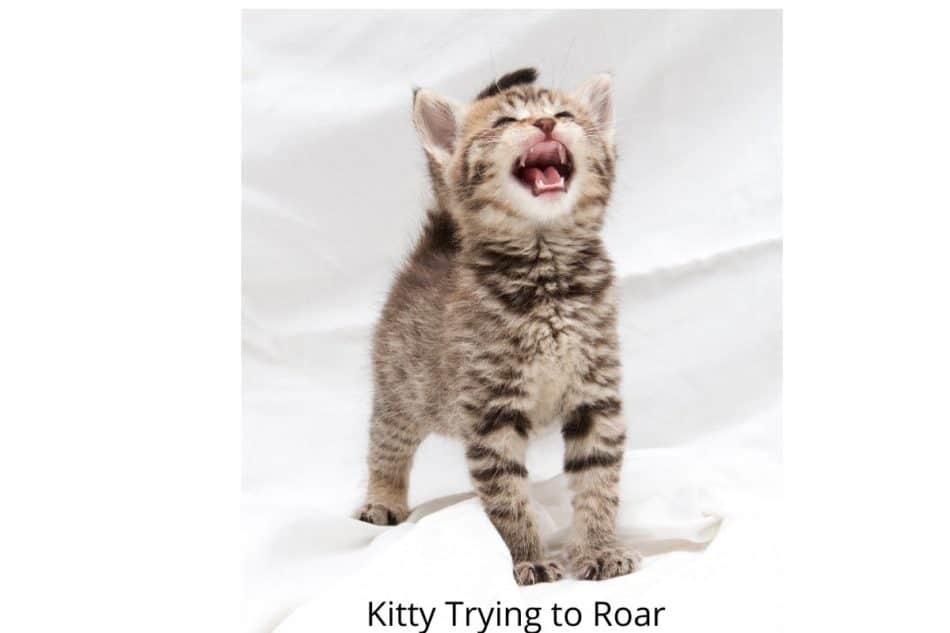Table of Contents
Introduction
I have never lived with a Siamese cat, but I hear they talk up a storm. On the other hand, some of the rescued cats that I have had the privilege of caring for hardly spoke at all. Just like people, some cats are talkative, some are not.
But they all seem to talk some of the time, and it’s important for us to do our best to understand what they are trying to say to us. Let’s see if we can discover what our cats are saying when they talk to us.
Why Do Cats Meow?
The Tufts University Cummings School of Veterinary Medicine published an article that informs us that while kittens do meow at their mother, adult cats only meow at us and not at other adult cats. So when you hear a meow, be sure to pay attention because they are talking to you.
It is thought that cats learn that meowing gets a human’s attention. If your cat wants or needs something from you, meowing is one means of making that request.
While it is possible your cat’s meowing may just be a way of saying hello, it is also quite possible your kitty is requesting something such as:
- affection
- food
- help for an illness or injury
This is a good time to pay attention to your pet and investigate what it is that they may need or may want. To help you with that, the folks at Lund University in Sweden have done a study that indicates what you might want to listen for in your cat’s meow:
- A short meow with a high-pitched voice that is rising usually means the circumstances are alright and they just want you to do something for them.
- A long meow with a low-pitch voice that is falling usually means the circumstances are not alright and they need you to take care of them.
An ASPCA article offers some other reasons your pet may be meowing to you:
- The water bowl is dry
- Your kitty is locked in a room or cabinet
- The litter box is not clean*
*To learn how to make cleaning the litter box easy, visit my blog post How To Set Up Your Cat Litter Box
Why Do Cats Purr?
A kitten’s first purring in life occurs during nursing.
According to a Library of Congress publication, purring is often an indication of contentment. This is a widely-held and long-accepted hypothesis on why cats purr, and in most cases there is certainly reason to believe this is so.
However, purring can sometimes be an indicator your cat is ill or injured. It is always a good thing to observe the existing circumstances and make sure all is well.
Additionally, a paper published by the University of Sussex UK informs us that cats will purr to solicit something from us. In particular they may do this to ask us for food. This solicitation purring is reported to have a higher-pitched component that makes the purring seem more urgent. So if your kitty is purring away while pointing your attention toward their food bowl, the message is probably “I am hungry”.
If you think you would like to try to get your cat to purr, How to Relax Your Cat is my blog post that may give you some ideas about creating contentment that will encourage your kitty to purr.
Do Lions and Tigers Purr?
According to an article found on purring.org there are some members of the cat family that cannot purr. These non-purring felines are referred to in the article as the “roaring cats”, and they are:
- Lion (Panthera leo)
- Tiger (tigris)
- Jaguar (P. onca)
- Leopard (P.pardus)

All other cats are able to purr, but not roar. I think many of our pet cats would really like to be able to roar, but just do not have the physical capability to do so. (I don’t think that stops them from trying on occasion.)

While all cats other than the roaring cats can purr, some cats that can purr may simply not engage in purring. This by itself is probably not indicative of a problem, if you suspect there may be a be a problem with a cat that does not purr, consult with your veterinarian.
Cat Sounds Other Than Meow and Purr
An article in the Journal of Veterinary Science lists 21 cat vocalizations. Here are just a few that I have heard from time to time. You will recognize these when you hear them:
- yowling – Your cat feels threatened.
- growling – “I am ready to fight.”
- hissing – As a snake would say, “back off”.
- chattering – This is something of a smacking sound. (I often saw this when one of our cats was focused on a bird or a squirrel out on the the porch on the other side of a glass door. The cat would be in predatory mode and swishing its tail, but fortunately could not get at the prey.)
Now that I think about it, that is not a very friendly list is it? I am glad the much happier meowing and purring are more commonly heard.
Do Cats Know Their Name?
Study results published in Scientific Reports proposes that cats living in typical home environments may be able to recognize their own name. In that study, cats that lived in a household were presented with a series of spoken nouns. The list included the cat’s name. When the cat’s name was called, the cats responded with ear and head movements that were not observed when the other words were called.
To offer something from my own experience, I have lived with cats that did seem to know their own name. Not all of our cats did this, but the fact that some did would seem to demonstrate that our cats are capable of recognizing their name.
Does My Cat Know My Voice?
Study results published in the National Library of Medicine reports on a testing method where recordings of stranger’s voices calling the cat’s name were played. Then the owners of the cats called out the cat’s name from a location out of sight of the cat.
Test results indicate that the cats’ response to their owner’s voice was different from the response to the strangers’ voices. This indicated the cat could tell the difference between their owner and the stranger based on hearing their individual voices.
Is It Okay to Scold My Cat?
No. Shouting at them when they misbehave doesn’t help.
A publication by the Cornell University College of Veterinary Medicine informs that yelling at your cat, shooting them with a water pistol, or scaring them with a loud noise, only makes them identify you with negative feelings. They do not connect any attempts to punish them to the mistake they may have made.
As always, do your best to make sure their behavior is not related to illness or injury.
To get them to stop doing things you don’t want them to do, try giving them alternative things to do that might capture their interest. Scratching posts, cat trees, and toys can be excellent distractions.
To learn how you might make your cat’s environment more interesting to them and keep them occupied, visit my blog post How to Choose a Cat Tree which includes information on scratching posts, and also my blog post How to Choose Cat Toys.
How to Learn More About Cats
Because there is no end to the incredible things we can learn about cats, you may wish to visit my blog post Learn About Cats
